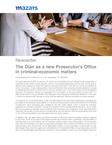
The Dian as a new Prosecutor's Office in criminal-economic matters
Through judgment C-002 of January 31, 2018, the Constitutional Court declared the exequibility of article 62 of Law 1819 of 2016 (last tax reform). This article establishes that the Dian will be able to discount any expense arising from typical conducts enshrined in the law as crimes punishable by willful misconduct. It also indicates that in the event that the Dian considers that the deduction should be disallowed because it comes from a criminal conduct, then it will send copies to the competent authority (Prosecutor's Office) to investigate the commission of the punishable conduct and, if it determines that it is not punishable, then taxpayers may charge the disallowed deduction in the year in which it is determined -through a ruling- that the deduction did not constitute a criminal conduct.
The request for unconstitutionality of this rule was based on the fact that it violated the constitutional principles of due process, presumption of innocence and good faith (articles 29 and 83 of the Political Constitution). Such principles are violated by the law under attack, since it would be indirectly qualifying as criminal a conduct -through the rejection of the corresponding deduction- by an entity that has no power to indicate what constitutes and what does not constitute a crime, and without the "accused" being able to exercise his corresponding criminal defense with the guarantees enshrined in the Political Constitution and international human rights treaties.
In addition, the rule lacks clarity and opens a number of scenarios where it could be arbitrarily applied by the Dian. Think of the case of the expenses that, as a license, and in good faith, may be paid by a businessman to a manufacturer who is licensing a patent without due authorization. Or the salaries that, without knowledge, a company is paying to a manager who could be committing crimes of unfair administration; why should they not be deductible? Where is the presumption of good faith? It may also happen that, once the copies are submitted to the Prosecutor's Office, the process does not end with a ruling that determines that "the conduct is not punishable", since it may well happen that such investigation is filed because the Prosecutor's Office considers that there is no merit (or that there is insufficient evidence) to proceed with it, a situation that, in light of the rule, would not allow the deduction to be charged in such year, since the requirement that there be a ruling "determining that the conduct is not punishable" would not be complied with.
It may also be the case that the "notitia criminis" gives rise to the opening of an investigation that never goes forward because it has been left (perhaps due to its technical complexity) sleeping "the sleep of the just" in some shelf of the Prosecutor's Office, which would lead to its archiving due to statute of limitations or expiration of terms. In the latter case, the taxpayer -despite the fact that there is no longer a criminal investigation- could not charge the deduction in such year, since the requirement of having issued a ruling determining that the conduct is not punishable would not be met.
Within the framework of the unconstitutionality process, important research centers such as the Universidad del Rosario and the Colombian Institute of Tax Law stated that the provision was unconstitutional and should be declared as such. In addition to the arguments already established, the first study center indicated that "the position that achieves greater protection of the right is that the actions of the Dian be subject to the judicial decision that declares the criminal liability of the taxpayer, and only then deny the deductibility of an expense (...)". The second study center additionally stated that, in addition to the above, the rule violated the principle of separation of powers contemplated in Article 250 of the Constitution, "since it grants the Dian exclusive powers of the Attorney General's Office, by allowing it to classify a conduct as punishable". The Court, in an analysis that is not shared, stated in its decision that there is no violation of the aforementioned constitutional principles because the tax system itself enables the use of mechanisms and resources that tend to guarantee due process and the right to defense.
This ruling, unfortunately, institutionalizes deinstitutionalization, as it legalizes the lack of separation of administrative and judicial powers, which is a basic pillar of any modern State. Likewise, it generates a system of "harmful collaboration" where the most harmed will be the businessmen, who are already in a kind of legal quicksand, where there is only uncertainty and where the lack of clarity in the role and function of each power system can lead to serious arbitrariness.


